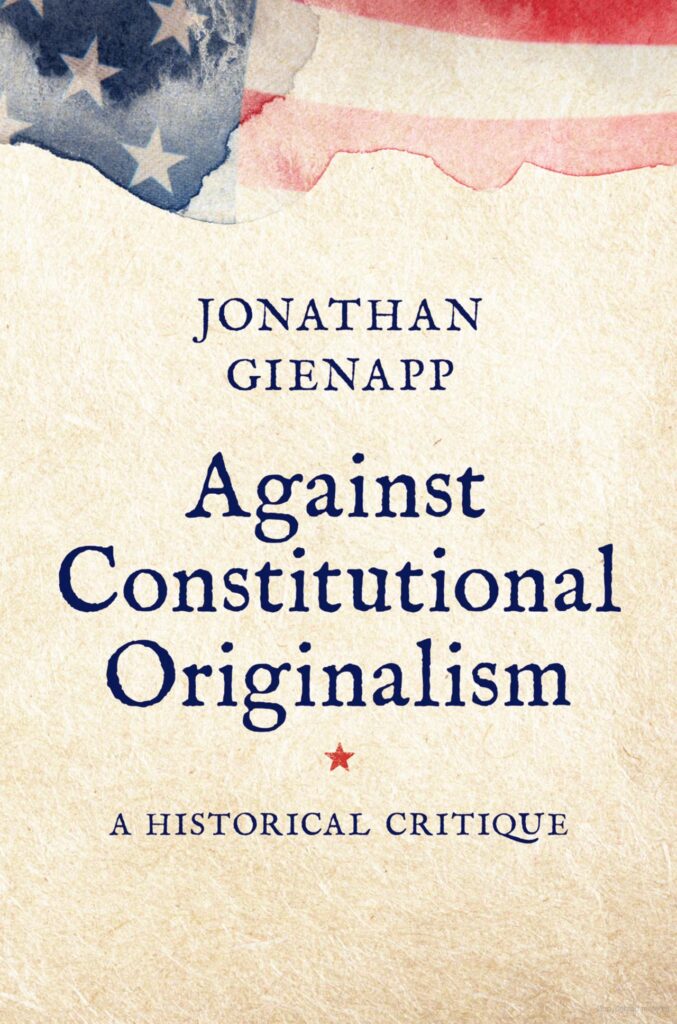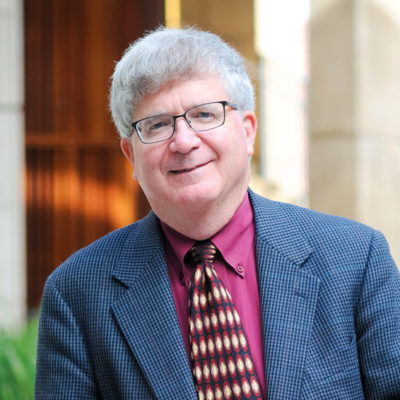Stanford Law Constitutional Scholars Spar Over Originalism and History
Stanford Law School Professors Jonathan Gienapp and Michael McConnell, two of the country’s foremost experts on constitutional law, recently came together for a wide-ranging discussion on how history, law, and politics intersect in constitutional interpretation. More than 100 people attended “History and Originalism: A Troubled Relationship,” held on February 4, 2025, and sponsored by Stanford Law School’s Constitutional Law Center.
The discussion focused on Gienapp’s recent book, Against Constitutional Originalism: A Historical Critique (Yale University Press), which argues that originalists—those who believe the Constitution’s meaning is fixed by its original public meaning—often impose modern assumptions on the past. Gienapp, a legal historian, questions whether originalism, as practiced today, accurately captures how the founding generation thought about constitutionalism. “Too often, originalists fail to take seriously the history they have pledged to follow. In looking to the past to divine the nation’s constitutional law, too often originalists fail to appreciate the difference between past and present and the difference those differences make,” Gienapp said at the event.

McConnell is the Richard and Frances Mallery Professor of Law and director of Stanford’s Constitutional Law Center, which hosted the event. He also is a Senior Fellow at the Hoover Institution. From 2002 to 2009, he served as a Judge on the United States Court of Appeals for the Tenth Circuit. At Stanford Law, he teaches courses on the history of the Constitution and the Reconstruction amendments. He argued that Gienapp’s critique of originalism, rather than being an indictment of originalism itself, may simply reveal that some originalists have not done their historical homework. In analyzing Gienapp’s “insightful and really great” book, McConnell said that Gienapp arguably is not targeting originalism per se. “Jonathan’s target is the entire tradition of constitutional judicial review in the United States, beginning with Marbury v. Madison,” he said. McConnell’s latest book, co-authored with Nathan Chapman, Agreeing to Disagree: How the Establishment Clause Protects Religious Diversity and Freedom of Conscience, was published by Oxford University Press in mid-2023.
What follows is a condensed Q&A capturing some of the key points of their discussion. Scroll down for a video recording of the full event.
Professor Gienapp: Can you summarize why, as the title of your book suggests, you are ‘Against Constitutional Originalism’?
My book presents a historical critique of the theory that contends that the Constitution should be interpreted today in accordance with its original meaning—the meaning it had at the time it was adopted. Because the Constitution has been amended several times, sometimes that compels interpreters to look at the more recent past, especially the important Reconstruction period that follows the Civil War when the 13th, 14th, and 15th Amendments were added. But more often than not, it sends interpreters back to the late 18th century, to when the United States Constitution was written and ratified and first interpreted.
All theories that propose some way to interpret the U. S. Constitution regard history as important some of the time. Originalism elevates history above all other constitutional criteria. It transforms history from a resource into a command. Right now, the use of history in constitutional interpretation is more prominent than it has arguably ever been, thanks to the fact that the federal judiciary is now stacked with self-identified originalists, many of them on the United States Supreme Court, which has been turning to history quite regularly to decide major questions of constitutional law.
Too often originalists fail to take seriously the history they have pledged to follow. In looking to the past to divine the nation’s constitutional law, too often originalists fail to appreciate the differences between past and present and the difference those differences make. The primary issue, I suggest, is what often goes unsaid or unexamined: Originalist investigation is often cast narrowly, obsessively focused on the category of original textual meaning. This is true especially because of the rise of the theory of “public meaning originalism,” the most dominant form of originalism, which says we should interpret the Constitution not based on what its authors intended or what people might have expected to follow from it, but what the words of the Constitution would have objectively meant to an average reader at the time they were created.
Are today’s originalists thinking about the Constitution in similar ways to the founders?
The Constitution that originalists hold in their mind is not the same in a lot of respects as the Constitution that the founding generation held in theirs. There was deep division at the founding over how to think about core areas of constitutional law and constitutionalism. The constitution’s essential characteristics were neither clear nor settled. All of this can be very easy to miss, I think, because superficially, it can seem as though the founding generation talked about constitutionalism more or less like we do today. But in reality, if you get past that, you find the conceptual foundations undergirding their constitutional thinking were in many ways quite different.

Can you expand on these conceptual foundations and the differences?
Founding era legal thinkers had different understandings of what it meant for a constitution to be written, to have fixed meaning, and to be fundamental law. The bulk of my book explores the history of 18th century constitutionalism to illustrate the crucial ways in which it differed from originalist constitutionalism.
The Constitution’s content, because it’s written, is created by text, and communicates that context through text. That’s why the Constitution’s meaning is its textual meaning. And this is why originalism is so often conflated with textualism in so many circles, most famously by Justice Antonin Scalia, who was the public face of originalism on the Supreme Court for three decades.
But the founding generation, I argue, did not see it this way. They did not believe that writing constitutional principles down automatically altered their legal status, transformed constitutional content into linguistic content, or erected sharp textual boundaries between what was in, and thus outside of a Constitution. And that was largely because of how they thought about fundamental law and the foundations of constitutional government. Yes, they thought that a lot of fundamental law was created through enacted constitutional text, but they also thought that a lot of fundamental law was grounded in other sources, such as custom and reason, and did not need to be enacted in constitutional text in order to enjoy fundamental status.
According to the Founders, where did these fundamental rights come from?
It was widely believed that most fundamental rights did not need to be enumerated in a written constitution to enjoy fundamental status. That was not simply because fundamental law, or natural law, was out there free floating, but rather because people at the time believed that these principles had been entrenched through the establishment of political society based on the premises of social compact theory, which was an essential language or paradigm of constitutional thinking in the 18th century, but has largely disappeared. It understood Constitutionalism in two steps: that you left the state of nature to form a political community or a social compact—you could call that Constitution One, which is not written. And then, having formed that political community, you established a form of government, or a constitution, which was Constitution Two. A lot of things, and especially fundamental rights, were understood to have been entrenched in the social compact— Constitution One—rather than the constitution of government, which came later, which was why so many of the original state constitutions did not have declarations of rights.
And when the Federalists decided to eventually add what we now call the Bill of Rights, James Madison and others, who were the architects of that project, made it very clear: We are merely making explicit what is already implicit.
Professor McConnell, as an originalist yourself, what is your take on Professor Gienapp’s book?
I consider this a very interesting, insightful book—a really great book. In contrast with a lot of the attacks on originalism that we see, Jonathan’s book is not based on partisan or ideological disagreements. It is not based upon any disagreement he may have with the results that originalism brings. I often get the impression that if only originalism produced the results that the critics would like, they would become originalists because that’s all they really care about: how the cases come out.

Jonathan gives a historical critique based upon his perch as an actual living historian, which many of us law professors are not. His critiques are primarily along the lines that originalists root our interpretations more on linguistics and modern jurisprudential logic than on actual history. And I think in many cases, he’s right. A lot of originalists are not very good originalists. And indeed, as we will further explore, I actually think Jonathan is a very good originalist.
I also want to compliment Jonathan on his emphasis on the non-court-centered nature of constitutional interpretation in the early Republic. So many of our constitutional law courses today overlook this. The Founders did not think that every constitutional question was going to go sprinting up to the nine—or at that time, five, and sometimes six—justices for an answer. They thought they would debate the constitutional questions themselves, maybe on the floor of Congress, maybe among the members of Washington’s cabinet, maybe in newspapers—this is how they expected constitutional arguments to take place. Today, if you look at most constitutional case books, you’d think that it’s all just, “Well, what does the Supreme Court think about this, what does the Supreme Court think about that?”
What are some of your critiques of the arguments in the book?
For one, the title: “Against Constitutional Originalism.” Is he really against it? That is by no means clear. His complaint, ultimately, is that originalists are not originalist enough. That they don’t follow their own premises. That they are not historical enough. That they misunderstand the nature of the Constitution historically.
And I think the conclusion, if you’re persuaded by the book, is that you should be more serious about history, you should be more serious about originalism, and you should do your originalist homework better. So I think the title is misleading. A better title would be “For A More Originalist Originalism.” But how many people would buy that book?
What then is the thing that he is really against? Jonathan tells us three things that are foundational to originalism: He says originalists presume that the Constitution is a text, its meaning is fixed and that it is a species of conventional law to be understood and interpreted like other kinds of law. Jonathan calls these suppositions “writtenness,” fixity, and law. And he says originalists get all this wrong. Each of these things—writtenness, fixity, and law—are misconstructions of how a constitutional constitution would have been conceived by folks at the time of the adoption of the Constitution.
My point about this is not that he’s wrong. The point is that his target is not originalism. If these three notions are the problem, Jonathan’s target is the entire tradition of constitutional judicial review in the United States, beginning with Marbury v. Madison, which said that “the people have an original right to establish for their future government such principles as, in their opinion, shall most conduce to their own happiness,” is the basis on which the whole American fabric has been erected. This is an attack on every species of constitutional interpretation that is based upon the principle of judicial review.
Watch the full discussion:
Jonathan Gienapp is an associate professor in the Law School and the History department. He received his B.A. from Harvard University and his Ph.D. from Johns Hopkins University. He specializes in the constitutional, political, legal, and intellectual history of the early United States. His primary focus to date has been the origins and development of the U.S. Constitution, in particular the ways in which Founding-era Americans understood and debated constitutionalism across the nation’s early decades. His historical interests intersect with modern legal debates over constitutional interpretation and theory, especially those centered on the theory of constitutional originalism. His first book, The Second Creation: Fixing the American Constitution in the Founding Era (Harvard University Press, 2018), rethinks the conventional story of American constitutional creation by exploring how and why founding-era Americans’ understanding of their Constitution transformed in the earliest years of the document’s existence.
Michael W. McConnell is the Richard and Frances Mallery Professor and Director of the Constitutional Law Center at Stanford Law School, and a Senior Fellow at the Hoover Institution. From 2002 to 2009, he served as a Circuit Judge on the United States Court of Appeals for the Tenth Circuit. He was nominated by President George W. Bush, a Republican, and confirmed by a Democratic Senate by unanimous consent. McConnell has previously held chaired professorships at the University of Chicago and the University of Utah, and visiting professorships at Harvard and NYU. He has published widely in the fields of constitutional law and theory, especially church and state, equal protection, and separation of powers. His book, “The President Who Would Not Be King: Executive Power Under the Constitution,” was published by Princeton University Press in 2020, based on the Tanner Lectures in Human Values, which he delivered at Princeton in 2019. His latest book, co-authored with Nathan Chapman, “Agreeing to Disagree: How the Establishment Clause Protects Religious Diversity and Freedom of Conscience,” was published by Oxford University Press in mid-2023.

